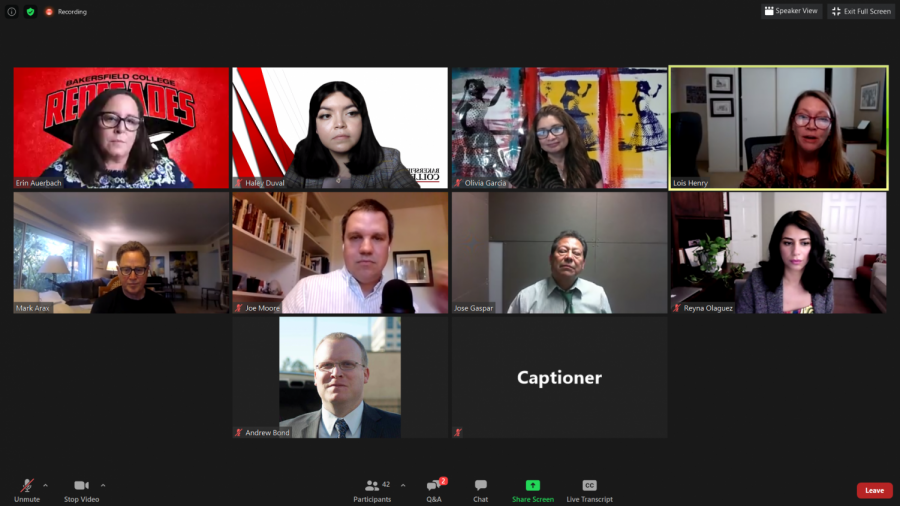BC presented a webinar about the past and present of journalism in San Joaquin Valley
April 23, 2021
Bakersfield College presented a webinar about the history of journalism and storytelling in Southern San Joaquin Valley in which every speaker talked about some of their experiences in journalism and added a few more thoughts about it for the future.
The webinar was co-moderated by Erin Auerbach, who is a journalism professor in BC, and Haley Duval who is the editor-in-chief of The Renegade Rip. The panelists, introduced by Auerbach, were Mark Arax, an award-winning journalist who wrote the book “The Dreamt Land: Chasing Water Across the Dust in California”; Olivia Garcia, a history professor at BC and a former journalist; Jose Gaspar, a news anchor and reporter for Telemundo Bakersfield and KGET; Lois Henry, chief executive of SJV water, a nonprofit dedicated to covering important water issues in the San Joaquin Valley; Joe Moore, president and manager of Valley Public Radio; and Reyna Olaguez, executive director of South Kern Sol.
The panelists gave more background information about themselves and how their long connections to the San Joaquin Valley. One by one, they talked about covering important stories in the Valley, and what they are working on right now.
“Now I’m just writing books, started in my backyard and now trying to figure out the whole state,” Arax said.
Most of them studied careers related to journalism. Henry earned a degree in history and then started to focus on journalism.
Duval started to ask the panelist questions. The first question was about their journalistic or literary influencers. Most of them answered that their inspirations or influences were people around them or writers and poets from the Central Valley. Garcia explained that she was inspired by Juan Felipe and that he inspired her to be more creative.
They said that they were inspired by their colleagues. Henry mentioned a phrase that was brought up by one of her colleagues about the journalism career, and how a journalist could not be loved by the things they say or expose.
“If you ever wanted to be loved, you should have been fireman (firefighter).”
Some of them had Latino influencers that inspired them also because they are Latino too, such as the case of Olaguez who was inspired by Luna Martinez and her Latino colleagues as well.
They talked about how technology would change the way they write stories or find them. Some of them said that, with technology, it has been easy to cover stories. Henry talked about how easier is to cover stories online rather than going there because sometimes she was not able to go. But most of them stressed that journalists do best when they get out into the field to talk to people and find their stories.
Some of them explained that, although they are “old-fashioned” covering stories, it is true that nowadays it is easier to cover a story. They also talked about some experiences they had while covering stories, and they talked about how some journalism students might be always on their phones and how they would rather send an email or a text than set up a call to interview. According to Auerbach, this could work but only if there is a follow-up.
They finished the discussion talking about journalism as a career and how some people tell young people that they should not look for a career in journalism. According to them, journalism is not a career that would give you so much money but is an encouraging career.






